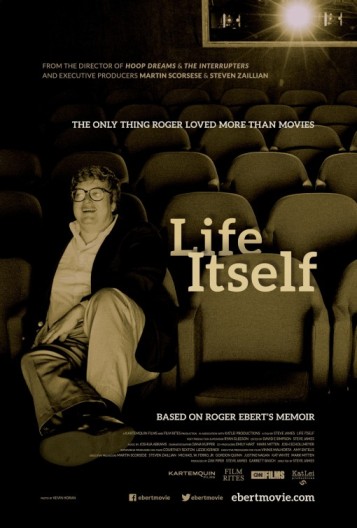Life Itself (Steve James, 2014)
Documentary director Steve James (Hoop Dreams, The Interrupters) began filming Roger Ebert five months before he died. Just as they began making the movie, Ebert was admitted to the hospital with a pain in his hip, which turned out to be a cancerous tumor. This followed a series of health issues that began in 2002, when the then 60-year-old film critic for the Chicago Sun-Times (made famous through his long-standing collaboration with Gene Siskel) was diagnosed with thyroid cancer, which ultimately led to the amputation of his lower jaw in 2006. In spite of that history, neither James nor Ebert, nor Ebert’s wife, Chaz, could have foreseen that Ebert would die (in April, 2013) before the project upon which they had just embarked would be completed. They had intended the film to be a celebration of Ebert’s life as a man, critic and thinker. It would have been nice for Ebert to see this moving tribute to him, but his death in no way inhibits the power of the encomium: indeed, taking its title from Ebert’s 2011 autobiography, the film is a most fitting eulogy, revealing Ebert in all his great humanity and intellect.
At times the film is hard to watch, since Ebert allowed himself to be filmed during his final days, and seeing the once vital television presence reduced (physically, not mentally) to a shell of his former self is painful. Still, though the lower part of his face may loosely flap where the jaw used to be, Ebert’s eyes remain bright throughout. Narrated by James, the film also includes interviews with Chaz, Ebert’s friends, his colleagues, filmmakers (including Martin Scorsese, one of the film’s producers, who wasn’t always well-reviewed by Ebert), as well as fellow critics (who didn’t always agree with him). We see archival footage from some of the many tapings of his show with Siskel (including behind-the-scenes sniping between the two, which is funny), as well as from some of his innumerable appearances at the University of Colorado-Boulder’s annual Conference on World Affairs, plus home videos of his life with Chaz and her children and grandchildren. We learn a lot more about the man (who won a Pulitzer Prize for film criticism in 1975), but for me to reveal all it in this review would spoil your pleasure in discovering the information, yourself. Suffice it to say that the film is about a powerful populist thinker who never doubted the ability of anybody, anywhere, to appreciate art as entertainment, entertainment as art, and to see thoughtful ruminations on both as one of the reasons we were put on this earth. As much as he loved movies, however, he also loved Chaz and his family, and life, itself.
This is the movie to see this weekend in Baltimore (it’s playing at the Charles Theater). Go.


1 Comment